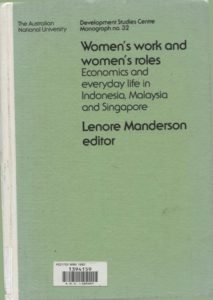About This Project
Women’s Work and Women’s Roles:
Economics and Everyday Life in Indonesia, Malaysia, and Singapore
Edited by
Lenore Manderson
The Book
Early observers of Southeast Asian societies frequently commented upon the varied and disparate nature of women’s work, and upon the authority and power which resulted from women’s active participation in the economy. Undoubtedly women in some situations enjoyed far fewer restrictions than did their counterparts in the homelands of their colonial rulers. The authors of this monograph have examined the roles of women, past and present, in a variety of societies, in Indonesia, Malaysia and Singapore. The chapters deal with specific societies and situations and no attempt has been made at a comprehensive overview of areas, ethnic origins, religious or social classes.
However, certain themes recur. One is that, since development and modernization began, women’s contribution to society has been increasingly ignored and undervalued. Second, although industrialized development has provided opportunities for training and for earning money outside the village environment, the opportunities have largely been for men. A third theme seems to be that, although many elite women have been able to take advantage of the opportunities generated by development, peasant women have almost always been disadvantaged. The chapters generally show that the official, Western-influenced, view of the woman’s role as primarily that of wife and mother has constituted a loss for all women, and has entrenched attitudes which do not necessarily conform to the realities of women past or present.
Series Monograph (Australian National University. Development Studies Centre) ; No. 32.

